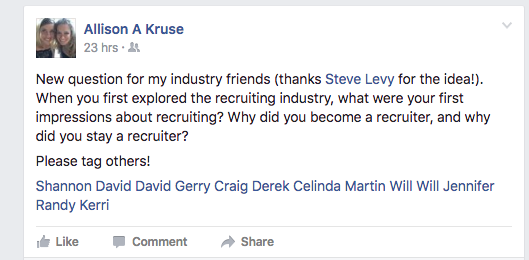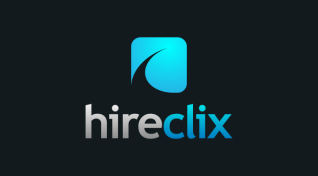…a funny thing happened on the way to the Forum. Wait… hang on, scroll past the picture.

Right then. The thing is, I’m in recruiting, and I get to conferences. A few weeks ago, at the Indeed Interactive conference, Jessica Miller-Merrell, and I got to talking at the bar, as people do. We were talking about all sorts of stuff (as people do). Our backgrounds came up – how we got to be where we are in our careers at that point in time. As I was talking about things, she said “You know, I don’t think a lot of people know how deep your background in the industry goes – you need to fix that. You should definitely write about it.”
I said I would. But I didn’t mean it. Or at least I didn’t think I did. I’ve made the same promise before, about writing in general – Jeff Newman is probably pissed about it, in his affable way. My college advisor gave up years ago.
I suspect my mom has given up, but that’s a whole ‘nother story. And that’s a two-way street, Mother!
(This guy hasn’t given up. But he’s a hopeless romantic.)
ANY-who. Then, this thread showed up on Facebook. I’d link to it, but you may not be able to read it. Here’s a screen grab, just to give a sense:

There were many sincere responses. People opened up about loving to help people. About bringing real change to an industry that has a bad (and, frankly, oft deserved) bad reputation. Improving the candidate experience. Changing lives. Changing how business is done.

And I, one of the industries awkward court jesters (there’s always at least one), wrote this:

I mean, it was kinda true.
But I felt bad. Flip, flippant, too cool for school.
Plus I’d promised to write about it.
AND, legitimate work reason: I need to sell my skills now. Because I am now a Consultant. That’s right: capital. Freaking. C. Baby. At a real company – a cool one, at that.

So… here it is: the story of RecruiterMoe (erm, that’s me – by way of starters: Moe was a childhood nickname from my godmother, I am a recruiter, and that Twitter handle happened be very available for some shocking reason…). Not the whole damn thing, mind you – I aim to leave a little mystery. So just the first chapters fleshed out, how I went from “Shit. I majored in writing poetry??” To somehow becoming someone who knows things people are willing to pay to gain access to. Holder of secrets and pathfinder of sorts. I’ll close with a sales pitch. Because: Consultant.
A genuine industry sherpa. Who woulda thunk?
Chapter 1: Zero Dark Recruity
College was interesting. Tucked away in the far far north of the States. Lots of characters, time spent in the deep woods. Then wrapping up in London and Europe. I bumbled around for a few years – argued with Franciscan monks about God. Moved to the South for a girl. Ran a bookstore. Things got Tennessee Williams level complex in my love life. Ran my ass back up to the North in a GTI that was a souped up and way too fast… I loved that car.
Tried my hand at publishing. The GTI and I parted ways at some point. Blown clutch, and trying to fund a business booking rock and hip hop acts around Boston made for a hard choice. Possible I should have chosen the car, possible not. Got to hang with the Mighty Mighty Bosstones, Perry Farrell, and this guy who called himself Moby. Almost got into a fist fight with the lead singer from the Lemonheads. Fun times, but bills to pay…
So… soon, I’m looking for a job. I have a stutter & talk way way way too fast.
I went looking. In the newspaper. That’s right: I. Am. Old. Monster was just emerging from under a router in an HR companies server room (I am not making that up) at that point. Newspapers had all the jobs.
I found an ad. It did make me laugh. And I found CPS – this client focused, ethical, old-school recruiting agency. Decided to use the word fiduciary in round 2 of my interviews, just to see if I could, because I thought it was funny.
They made me an offer. I think it was because the branch director was an obsessive reader of great books, and hated TV. We got to talking about books in the interview.
About that speech impediment? Making a living at full commission, on the phone (so: voice only) made a ton of sense.
Seriously: I wanted to force myself to talk slower. Fear of not eating, and being evicted, seemed like decent motivators to me at the time. Plus if I did it right: money. I was sick of eating ramen noodles, and praying I didn’t get sick, since, hey who needs health insurance, amiright? (Thanks for not being President yet, Obama… could have used your help). Over the next 5 years, I was trained in a few things:
- Service, to clients and to candidates, is a granted privilege (that’s the company motto)
- Screw that up, by being dishonest or cutting corners, and you’re don’t deserve to be a recruiter
- I thought that was how all recruiters felt (I was, sadly, very wrong)
- Screw that up, by being dishonest or cutting corners, and you’re don’t deserve to be a recruiter
- Mistakes happen – just own them when they do
- Money isn’t the most important thing, but it helps pay bills – just don’t make it everything
- Talk slower… No, Martin: slower
- I had a girlfriend who hated how I talked to her when I was on the phone from work “You talk so normal.”
- I knew I’d won something at that point
- I had a girlfriend who hated how I talked to her when I was on the phone from work “You talk so normal.”
- I also convinced them that using e-mail was okay. And that the Internet, and e-commerce companies, were okay to do business with.
Chapter 2: Internet and Ecommerce Companies Are Not Always Good to Do Business With (Or: what they hell is that sound? It sounds like something popped… like a million VC-backed companies crying out in anguish all at once, and then… nothing)
2001-2005 quite literally sucked at a business level. On a personal level, I got married and became a dad. Took a lot of the suckage out of things, and replaced it with this blissful exhaustion. My wife was generally freaked out at the roller coaster a full commission recruiter’s income becomes when the economy is in free-fall. I left CPS and took an outside sales job selling agendas and 7-Habits curriculum to school districts that were watching their budgets get slashed every minute. Managed to increase the territories sales – I am not sure how I did this. I drove a fantastic old brown Legacy wagon named Midge.
One day, I saw my future, and… no.
Chapter 3: Once More, Into the Breach
I missed the hell out of recruiting. I’d been so good at it. It was fun, I got to meet new people, learn about all kinds of businesses, and I could support a family. Decided to go back in.
I wanted to try out corporate – no idea why, aside from a vague feeling that being a hired gun gets tiring. And I was curious. On the agency side of the world, corporate recruitment gets ridiculed. I wanted to find out if all the snide comments were true.
But then I got to thinking that there was no company in the world that would hire me into corporate, with the economy still shaky, what with me having been out of the game for a few years. So I went and talked to a bunch of agencies, found one that seemed promising, and took a desk.
I didn’t like it. The thing at CPS was all about ethics and service. That we checked references thoroughly on candidates before submitting them, verified college degrees, all of it. If we found out something bad, we did not submit them. Period. We could call and talk through the issue with the client, if the candidate had a strong enough background and whatever we’d uncovered seemed potentially reasonable, but it was never to be done as a sell. Our job was to protect our clients, not make money and run. And that went to candidates, too – bad clients who didn’t treat their people well were verboten. The idea was that behaving this way, paying it forward, would come back as a benefit – a long game. You’d hear from clients, as well as candidates, quite often “You people at CPS are just different from any other recruiters I’ve ever worked with – you seem like real people.”
It was naive of me to think that was the norm. Turns out, most agencies will tell their people: “If you find a bad reference, bury that shit and find a good one. Tell the candidate to never bring it up. Also, you found out they lied about their degree? Only submit them to clients you know don’t do degree verification. Get the placement.”
I really didn’t like it. I couldn’t do it, and decided to leave.
At the same time, I was reading this new (to me) site, called ERE. Lots of great info on recruiting, trends, etc etc. People who seemed to believe in recruiting as a calling. A way of doing good, while making a living. Cool stuff. One day, while reading it, I saw an ad for a company called ZoomInfo. I liked their tech, and got a demo. I was also in the habit (still am) of checking out interesting companies for fun. I’d recently written Big Ass Fans a fan letter (yeah, pun intended), and gotten a bag of swag as a thank you. I was thinking about doing the same with ZoomInfo, when I realized they were 1 goddam mile from my house.
1 mile. So, I went to their career site. They were looking for someone to run corporate recruiting! I’d never done that before. But, I figured, at one point I’d never ridden a bike. Or kissed a girl. There’s always a first time, right?
You know what I did? I wrote the Mother of all Cover Letters. It was beautiful. I wish I still had it (this was pre-Cloud, and it’s likely on a hard drive in some dusty corner). Bryan Burdick, who I suspect is a genius, was the new COO there. He loves good writing, and he appreciates a great cover letter.
He hired me. It was time for me to hang my guns up, and ride out of town.
Chapter 4: Goodbye Shane, and Hello Sheriff
To tell you the truth, Bryan’s brilliant. I also suspect he’s insane. He’d just hired a guy whose entire recruiting experience consisted of working on the agency side, recruiting actuaries and accountants, to build internal recruiting at a fast-growing internet start-up. Not only that, but the CEO had the classic engineering-CEO disdain of HR. So, it was up to our controller and me to be HR. Bear in mind: I’d only been in an HR department once, years earlier, and it was to get yelled at.
Have you met me? There is no way I should ride shot-gun on an HR department. I mean, when they told me they were thinking about doing sexual harassment training, I quipped “There’s a class for that? I thought that stuff just comes naturally to some people.”
We were hiring software engineers – and not just web-devs, but experts in natural language processing, AI-driven, big-data search. Before those skills were at least relatively common in the software community. In a location that was nowhere near Cambridge or Boston. In an office park in a remote corner of a suburb. The subway did not, and will never, go there. Hell, the nearest bus stop was blocks away. And they wanted shiny kids from MIT.
We were also hiring marketers. Sales reps. Product managers. Executives.
Oh, and, over 4 years, maybe 3 accountants.
Like the GTA sheriff above, I decided to get scrappy (no, I didn’t shoot anybody – thought about it, but didn’t go for it). Since I was a department of one, I needed to use tools, I figured, to increase my destructive power – err, reach. So, I decided an ATS was a good idea.
(Btw, day 1 on the job? Nobody was expecting me. My boss wasn’t in yet. My desk was covered in a layer of dust, the light didn’t work, and the IT guys – who I rapidly came to love – had no idea I was starting, so hadn’t set up my desktop yet. Also: I had a used desktop. Not a laptop.
One of the first things I created was an onboarding plan).
I knew jack-shit about corporate. About software. About, hell: Excel.
When the Director of Core Dev said “We need to create some reqs,” my first thought was “Wrecks? I know about getting wrecked. Maybe he wants to go binge drinking?”
Luckily I knew how to fake it, and figure it out fast. Plus – turns out, not knowing what I was doing was an advantage. I didn’t know any better. Figured what I was doing was normal.
So… I found an ATS. Shopped around, did bake-offs. In the end, Colin Kingsbury had a solid one called HRMDirect that fit our needs. So I learned how to implement an ATS. Which meant not sleeping for a while, but: learning experience. We were a startup, figured that’s how we did it.
There were a lot of reqs. That’s right: I’d figured out what the word meant (thanks you Google). Hell, I’d gone and created a req-approval process that included service-level-agreements with the hiring managers, all done paperless. So I was sourcing. Prepping candidates. Scheduling interviews. Checking references. Making offers. Assessing, and training, interviewers on interviewing. Created an offer letter doc and process. Full-boat recruiting.
And… I was doing content marketing. Without any clue, I was doing inbound marketing before HubSpot was even a blip. It wasn’t genius. It was just me assuming “This makes sense, this will make my life easier, I’m assuming everyone else is doing this because it makes sense. I have so many reqs. Holy shit I need more candidates! Whadda ya mean you want a weekly dashboard for the exec team – aaargh….” Finding a way to multiply myself mattered. I was encouraging our employees to blog (this was 2006 – blogging was this random new thing – I know, I know… amazing how quickly things age…) Getting their names out there, tied back into our career site. Creating thought leadership everywhere we could that candidates we wanted might see it. Set up a blog on my side, too – the one you’re reading.
It seemed pretty clear that a blog that was all just reposted jobs would be.. boring. Like a radio station that was all ads – not content. So I decided to make mine about career advice, with the occasional post about ZoomInfo (like, every 5 or 6). I found a widget that could pull in freshly published jobs into a sidebar on the blog, from our carer site.
We set up an employee referral program, and worked with Marketing to create buzz (proud to say that at its peak, we were over 60% employee referrals).
Oh: and the career site got rebuilt. That was fun. Learned about A/B testing. Site maps. Created a voice for our employment brand in the process. It doesn’t look the same anymore – I still think mine was better.
And job postings… I had fun there.
Rock Stars: that may be my fault. Not sure. All I know is, I was up one night, late, and needed a generic description. I didn’t want to miss great people once I’d pulled them into the site, just because they didn’t see an opening. So… I was watching the show 6 Feet Under. One of the characters called the other “You’re such a rock star!”
It seemed cool at the time. Different. I wrote a description called “General Rock Stars”. It got blogged a bunch as a great example of how to do a job description. Next thing I knew…
Look: I never called anyone a ninja. Or guru. But, rock stars is something I caused, or at least helped accelerate: mea culpe. I just liked the line in the show…
Along the years, I kept trying on hats: designed & project managed a physical expansion of our headquarters; stepped into product marketing when we laid off our recruitment product marketing team; did some of the aforementioned HR stuff; worked a booth at conferences with our sales team; gave some talks to recruiting teams, helping schlep our products. Wrote copy (I’m fond of the summary I wrote here). It kind of goes on from there…
End of the day, I took an offer for a package, when the company shrank in 2010 – and it was perfect timing. I’d done a ton. Learned a lot. Had fun, got tired, did it again. But it was time.
Chapter 5: And This is Where I Start to Leave You
Look, you’re read a lot. If you’re still here (hi Mom). So thanks. I promise this starts to wind down.
After ZoomInfo, I kept going. Started my own business – Talent MatchUp – helping with talent products, career site design, branding, sourcer training.
design, branding, sourcer training.
Realized I was faking it. Went to Paris. Did a bunch of thinking on bridges.
Paris was fun. And it gave me time to think about consulting. I knew I enjoyed it, and that I had information, and leadership, to offer, but that I wasn’t fully baked yet.
Chapter 6: PreBirth of the Cool Consultant
Here’s some advice: If you’re hiring a consultant, make sure they’ve actually done your job (or something equivalent) before. If they haven’t led TA, built a department, hired & fired… if they haven’t implemented an ATS that they then had to live with, haven’t built and run processes that – you guessed it – they had to live with… how can they help you do that? Consultants who haven’t taken arrows, spears, and blows to the head as a result of their decisions cannot help you avoid those types of injuries. They lack the nuanced information that comes with doing the job. That’s what I realized in Paris.
To get to that point, where I could feel legitimate in my advising, I focused my company on being a mini-RPO for one major client, who I could get to know well, and advise, and prepped myself to go back inside. Joined, and then as head of global TA scaled a company from under 100 employees to close to 450, helped lead their international expansion, lived part time abroad, built teams & managed them. Then went to PwC. Learned about massive corporate, about matrixed environments. About OFCCP compliance – and what it’s like to live in that environment, and the subtle ways to work there. Helped them transform their recruitment technologies.
I built skills, in other words. Because, I wanted to be able to give advice that came from actual experience. Advice that would help, and create value – because as I’d learned several chapters back, that’s the long-game. Not spending 6 months at a client, hand them a deck with high-level buzzwords and bill them 6-figures (that happens, and people let it happen).
Chapter 7: C for Consultant (or: Bring the Noise, Bring the Pitch)
 HireClix. Hire. Freaking. Clix.
HireClix. Hire. Freaking. Clix.
We’re building something bold. Funky. Fresh. The team here is brilliant – I’ve used them as a vendor in the past, and the contrast with the TMP’s of the world is shocking. Service matters to me, as does expertise – if that’s not clear already. This team lives and breaths those attributes. They’ve built on that, and the client list is scaling rapidly – Fortune firms are moving over, and others are trying to end contracts to do the same. They know how to help companies improve recruiting technology efficiences, are service consultants for some of the leading ATS & CRM platforms, build creative, etc. It’s a solid offering. With my joining, we’re setting up a service that will provide practitioners with real world advice and guidance around talent acquisition, particularly technology. How to gauge its effectiveness. How to untangle the spaghetti mess of legacy systems. What tools to invest in towards the future, and what the future looks like. How to get their purchases approved.
Need to write an RFP? We’ve got real-world experience there. Want to do a pilot, and measure it? Done that over and over. Need a perspective on why you didn’t select the tool the Managing Director’s wife’s cousin built that “He’s sure we’ll want to use – oh, and he told me that he’s in talks with all of our competitors”. Lived that, can help you be ready with docs, decks, whatever you need for air cover. Heck, you can even make us the scapegoat – that’s our job. We will help you look amazing.
So… yeah. This was supposed to be acres shorter. Became a bit of a ramble, wound up with a sales pitch (hey, I’m excited, okay?). You can reach me here: martin@hireclix.com
I’ll leave you with this. Complete non-sequitor, but he is America’s finest actor.




